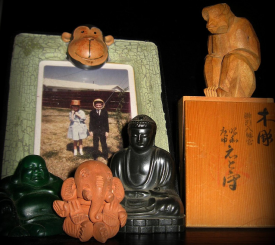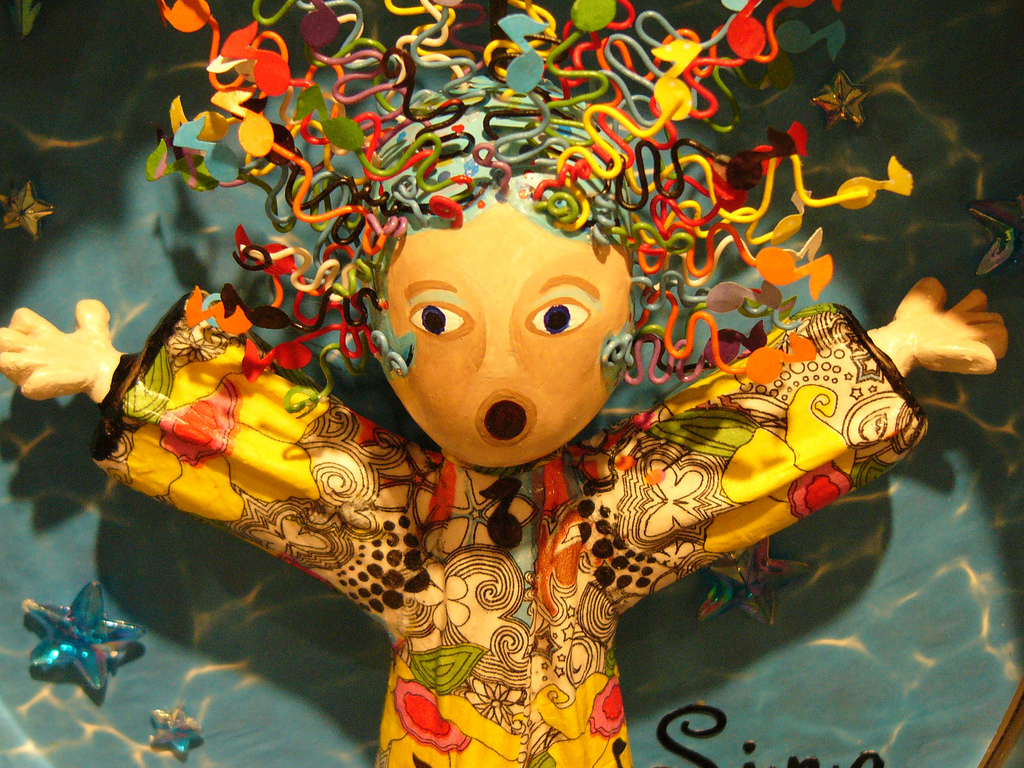TW Column by Emily Toth
Can You Love the Site You’re With?
Got my diagnosis. I’m a “sucker for irrelevancy.”
 As soon as I read that charming insult—in an article on (what else?) distraction—I had to stop everything and find out which genius had come up with such a nasty little morsel of truth.
As soon as I read that charming insult—in an article on (what else?) distraction—I had to stop everything and find out which genius had come up with such a nasty little morsel of truth.
The “everything” I had to drop wasn’t much. I was trapped on the hamster wheel of the Net. I was pulsating and surfing, noshing, emailing, liking and lurking and tweaking, kvelling and kvetching. It was an average day at the computer in our barbarous times.
I’ll stop now. For the sake of you, dear reader, I’ll slow down and write the kind of coherent sentences that used to come easily. I’ll unitask. (Is there even such a word? I won’t stop and look it up. I really won’t. Well, maybe I’ll peek….)
Okay, I’m back. What was I writing about?
Oh, yes. Well, Professor Clifford Nass of Stanford is the one who said his students are “suckers for irrelevancy.” So are we all, and most of us are also slaves to our gadgets. My students sleep with their phones, their cats, and their laptops, “and my partner keeps whining about space,” one student—I’ll call her Anita—told me.
So Anita needs a bigger bed. She surfs around, gleaning. Millions of people all over the world have posted opinions and tips on bed buying. What if she misses the memo about the bed to end all beds?
Going to a bed store first—real life!—would be too scary. She might have to talk to someone, some intense salesman who’s busy tapping away on his device and would rather not be bothered. He’s got stuff to tweet. He could be a poet.
I remind myself that, despite all this, Anita is a dedicated and fearless writer. She’s the one student of mine who willingly took on writing about the Steubenville rape case. She looked at all the videos, read all the vile texts, and distilled the story for my class. Despite the siren song of the Net, Anita can do concentrated work.
 I’m not sure everyone can. We love to be swept away, tiny boats on a wide, thrashing sea of…themes and memes and viruses?
I’m not sure everyone can. We love to be swept away, tiny boats on a wide, thrashing sea of…themes and memes and viruses?
It’s always been the writer’s challenge: focus, focus. We complain about being interrupted and distracted as though it’s a modern problem, but, in the 1890s, Kate Chopin was lured from her concentrated writing “to struggle with the intricacies of a pattern” or fight “the temptation to try a new furniture polish on an old table leg.”
Households have always derailed women. As Virginia Woolf said, a woman writer has to have “an independent income and a room of her own.” John Stuart Mill, abetted by his wife Harriet Taylor, complained in The Subjection of Women that a wife “must always be at the beck and call of somebody, generally of everybody.” The mother in Tillie Olsen’s story “Tell Me a Riddle” appreciates aging because she no longer has to “move to the rhythms of others.”
These are some of my musings about distraction. I was starting to put them in a folder, along with many learned treatises, when Xena, the furrier princess, yowled for her Friskies. Well, petting a cat can focus the mind. It lowers the blood pressure. That’s documented. And yet the surveillance-happy National Security Agency, I read somewhere, “does not want your cat pictures.” Why in hell not? I snarl at the screen.
It’s always been hard to have “primary intensity for three hours a day,” as May Sarton wrote in the 1970s. Yet, even I have found a couple of ruses for writerly self-discipline in our chaotic times. I don’t tweet, and I don’t know how to download and play music (“songs”). I write in semi-silence, and I don’t have the twitch-fits of people who must fondle their phones to feel alive.
But who’s reading me, especially if I write a long paragraph? Am I writing songs that voices never share?
Maybe it’s enough to express an off-the-cuff opinion on Facebook and get a couple of “likes.” If the goal of writing is to communicate, maybe that’s enough excitement for one day.
But writing is also a way to penetrate other people’s minds. Who can resist a good browsing? The Net lets me sample or devour long, wry, curmudgeonly pieces that give me the gossip, humor, and new information that I crave. I have the insatiable curiosity (or hunger for irrelevancy) that we all do, but I feed it with old-fashioned dyspeptic prose rather than 20-word tweets and Facebook updates.
In print or online, I like satirists, social critics like Gina Barreca, Gail Collins, and the late Nora Ephron. And after a lifetime of reading and cherishing women writers, I find I’m distracted by and drawn to the big, booming, male, self-confident voice. Maybe Virginia Woolf was right in A Room of One’s Own that “the weight, the pace, the stride of a man’s mind” is different from a woman’s. Maybe I find male writers intriguing because I now have more self-confidence—or more devil-may-care, I-don’t-give-a-shitness—than I used to. I know I’m not going to die young, tormented and wounded by an uncaring world.
 I’ve always read particular writers to set the mood for my own writing. I absorb their voices, turning them into pieces of music that stick in my brain for hours, making a weird soundtrack for my life. (One of our language’s most gorgeous-sounding words, diarrhea, can be sung beautifully to the tune of the “Hallelujah Chorus”: “Diarrhea! Diarrhea! Di-ah-ah-ree-ah!”)
I’ve always read particular writers to set the mood for my own writing. I absorb their voices, turning them into pieces of music that stick in my brain for hours, making a weird soundtrack for my life. (One of our language’s most gorgeous-sounding words, diarrhea, can be sung beautifully to the tune of the “Hallelujah Chorus”: “Diarrhea! Diarrhea! Di-ah-ah-ree-ah!”)
But I digress, of course.
Edith Wharton’s prose was my pleasure and guide when I was writing my dissertation. I wanted to emulate the perfect balance and rhythm of her sentences—so different from the ponderous, absurd writings that I was assigned for literary theory. Many of my classmates drowned in jargon. I snickered and refused. Instead, I learned to write with such clarity that one of my professors predicted I’d never make it as an academic, because my writing was too clear. (He didn’t get tenure. I did.)
In his honor, I will conclude this column with a thundering, authoritative pronouncement in the kind of writing voice I like best: direct, bombastic. I don’t like niceness, and I’d rather be shocked—or even infuriated—by the likes of David Sedaris or Christopher Hitchens, who claimed that women aren’t funny. What did he know?
Yea, verily, I shall go to the Net and find audacities to quote—since the second hardest thing about writing is finding the perfect ending. Now I’m trolling around, hoping that the muse will present me with the perfect bon mot, the ingenious snapper that will pull everything together. It will make you, my readers, amused and satisfied that you haven’t wasted your time. This column won’t feel like a distraction. It will be the peak experience of your week.
So far, though, the perfect ending hasn’t come to me. There’s too much to look at on the Net. Maybe if I just check out a few of Dave Barry’s old, perfectly rounded columns…maybe if I take a peek at Erma Bombeck…or check out how Garrison Keillor gets out of one scene and into another….
Or I could just say: You’re on your own, kid. Tweet, fritter, sweep, flail. We plink, therefore we are.
Publication Information
- “Media Multitaskers Pay Mental Price, Stanford Study Shows” by Adam Gorlick, Stanford Report, August 24, 2009.
- “On Certain Brisk, Bright Days” from The Complete Works of Kate Chopin by Kate Chopin, edited by Per Seyersted (Louisiana State University Press, 1969).
- A Room of One’s Room by Virginia Woolf (Hogarth Press, 1929).
- The Subjection of Women by John Stuart Mill (Longmans, Green, Reader, and Dyer, 1869).
- “Tell Me A Riddle” from Tell Me A Riddle by Tillie Olsen (Lippincott, 1961).
- May Sarton quote from The Life of the Creative Spirit by H. Charles Romesburg (Xlibris, 2002).
- “It’s Not About Your Cat Photos” by Beverly Gage, Slate, June 10, 2013.
Art Information
- “Morning Meditation & the Monkey Mind” @ Elyce Feliz; Creative Commons license.
- “Chaos Ride” @ Heather; Creative Commons license.
- “Sing” @ Kathleen Tyler Conklin; Creative Commons license.
 Emily Toth is a contributing writer at Talking Writing, where her column “Nothing but the Toth” appears regularly.
Emily Toth is a contributing writer at Talking Writing, where her column “Nothing but the Toth” appears regularly.
“When my mother hated Nature, she was saying she preferred stories about things—and people—that mattered. She never met a cow she liked.” — “The Outdoors is Not in My Nature”
